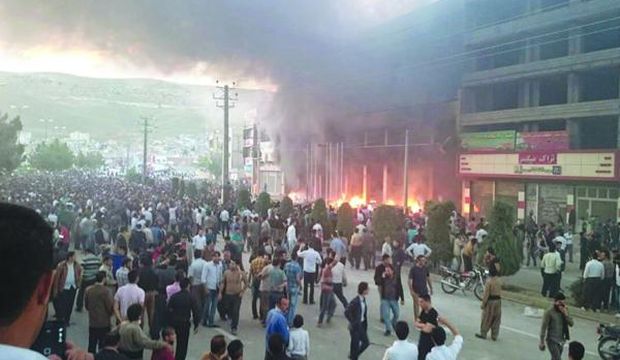
Protesters march as a building burns in the Iranian city of Mahabad, 421 miles (678 kilometers) northwest of Tehran, following the death of a young Kurdish woman who was sexually assaulted by an Iranian man, believed to be an Iranian intelligence operative, which led to her death. (Photo courtesy of Rudaw)
Erbil and Mahabad, Asharq Al-Awsat—On Sunday, and for the fourth day in a row, violent protests rocked the Kurdish-majority city of Mahabad in northwestern Iran, after the death on Thursday of a 25-year-old woman whom sources say died after an Iranian intelligence operative attempted to rape her.
Violent clashes broke out between the protesters and Iranian security services as the demonstrators set fire to the Tara hotel where the young woman, Farinaz Khosrawani, worked, as well as other buildings, according to Kurdish news website Rudaw.
Reports allege an Iranian intelligence operative attempted to rape Khosrawani in his hotel room. She tried to flee and then either fell from the balcony of the hotel by accident or jumped deliberately to commit suicide, depending on differing accounts.
The protests have now spread to other cities in the country with large Kurdish populations, Hussein Yazdanpanah, the secretary-general of the Kurdistan Freedom Party (KFP), a Kurdish–Iranian opposition group based in Iraqi Kurdistan, told Asharq Al-Awsat on Sunday.
“The protests have now spread from Mahabad to the cities of Dukan, Shanu, Marivan, Sardasht, and Sahneh,” all in Iran’s northwestern region, Yazdanpanah said.
Iranian security services were sent from the nearby cities of Hamadan, Esfahan, and Kirman to contain the protests, clashing with the demonstrators and arresting more than 200, most whom came from Mahabad, he added.
Yazdanpanah said three protesters have thus far been killed during the clashes and dozens more injured.
The situation in Iran’s northwest now appears to be quickly escalating, and the incident which sparked the initial protests has tapped into Kurdish resentment in the region, Yazdanpanah said.
Mahabad is the former capital of the self-proclaimed Republic of Kurdistan in Iran. Iran recaptured the city in 1946.
Iran’s restive northwestern region has seen intermittent conflicts between Kurdish separatist groups and the Iranian regime since the Islamic Revolution in 1979.
Separatist groups have been vying for political and cultural autonomy for the region’s estimated 7 million Kurdish inhabitants.
Yazdanpanah told Asharq Al-Awsat his party had now set up a specialized operations room for the “uprising” against Tehran, as he referred to it, and is calling on all Iranian Kurds to protest in large numbers.
He added that these demonstrations should remain peaceful, and that any clashes with security forces should be avoided. Kurdish fighters, including the Peshmerga, were “nearby,” he said, and would soon enter the areas to protect the demonstrators from the Iranian security services.
Peshmerga, literally “one who confronts death,” is the informal name given to Kurdish fighting forces, though the name is usually used to refer to the official military units belonging to the autonomous Iraqi Kurdistan region, which borders Iran’s northwest and whose capital Erbil lies some 170 miles (276 kilometers) west of Mahabad.
“Iranian Kurdistan’s Peshmerga units were forced to deploy in some areas [after the clashes], and in [other] areas have launched attacks against Iranian military units heading [towards Mahabad] . . . There have also been attacks against Iranian security offices in the region, and we expect more of these retaliatory incidents to continue in the coming days,” Yazdanpanah said.
Smear campaign
Meanwhile, Iranian state news outlets have said the man at the center of the incident which sparked the protests has been arrested and questioned. They have denied he is an intelligence officer, instead claiming he is a Tourism Ministry employee.
However, a source close to the family of Farinaz Khosrawani, the woman he is accused of attempting to rape, told Asharq Al-Awsat the Iranian regime often sent intelligence operatives to the restive northwestern region under the guise of Tourism Ministry officials.
“The Iranian Tourism Ministry is in reality a subsidiary of the Iranian security and intelligence establishments, and everyone in Iran knows that many [civil] institutions in the country are run by [intelligence operatives],” the source, who requested anonymity, said.
The Iranian man, whom the source says is an intelligence officer, was at the hotel on assignment to give a report on the activities at the hotel to his superiors and make an assessment of the establishment.
The source said there had been some collusion between the owner of the hotel and the intelligence agent, whereby the owner offered to send the girl, Khosrawani, to the agent’s room if the latter agreed to give a positive report on the hotel and recommend its being upgraded from three to five stars.
The owner of the hotel, who is Kurdish but not a native of the region, is known in Mahabad for his dealings with Iranian intelligence, the source maintained, and has amassed great wealth in a short space of time as a result.
Khosrawani was then sent to the Iranian man’s room, under the pretense that she would answer some questions from a Tourism Ministry official regarding the hotel and her work. The source said the official attempted to rape Khosrawani. In her attempt to flee, she then “committed suicide,” according to the source, by jumping from the balcony.
The Iranian man, 37, has confessed to attempting to rape Khosrawani, according to Iranian state news outlets, and is currently undergoing questioning.
The source told Asharq Al-Awsat that Iranian news outlets have been engaged in a “smear campaign” against Khosrawani, and have claimed she was working “in collusion” with the hotel owner—though the source did not expand on this accusation.
Asharq Al-Awsat attempted to speak with the family of Khosrawani, but the family home is, according to the source, now guarded by Iranian security forces, with members of the family currently under surveillance.
Dalshad Abdullah and Roshan Qassem contributed reporting from Erbil and Mahabad, respectively.
